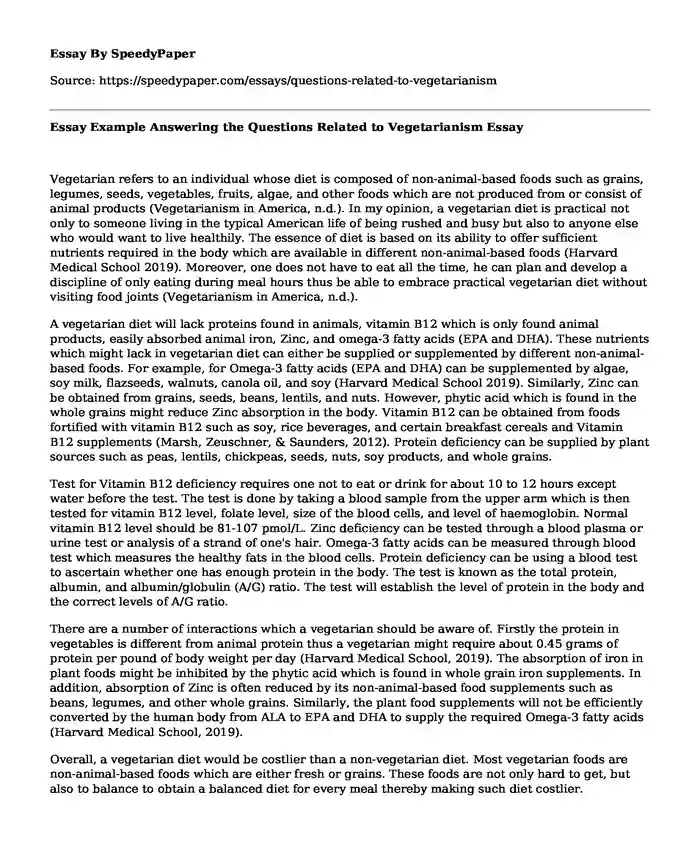
| Type of paper: | Essay |
| Categories: | Vegetarianism |
| Pages: | 3 |
| Wordcount: | 746 words |
Vegetarian refers to an individual whose diet is composed of non-animal-based foods such as grains, legumes, seeds, vegetables, fruits, algae, and other foods which are not produced from or consist of animal products (Vegetarianism in America, n.d.). In my opinion, a vegetarian diet is practical not only to someone living in the typical American life of being rushed and busy but also to anyone else who would want to live healthily. The essence of diet is based on its ability to offer sufficient nutrients required in the body which are available in different non-animal-based foods (Harvard Medical School 2019). Moreover, one does not have to eat all the time, he can plan and develop a discipline of only eating during meal hours thus be able to embrace practical vegetarian diet without visiting food joints (Vegetarianism in America, n.d.).
A vegetarian diet will lack proteins found in animals, vitamin B12 which is only found animal products, easily absorbed animal iron, Zinc, and omega-3 fatty acids (EPA and DHA). These nutrients which might lack in vegetarian diet can either be supplied or supplemented by different non-animal-based foods. For example, for Omega-3 fatty acids (EPA and DHA) can be supplemented by algae, soy milk, flazseeds, walnuts, canola oil, and soy (Harvard Medical School 2019). Similarly, Zinc can be obtained from grains, seeds, beans, lentils, and nuts. However, phytic acid which is found in the whole grains might reduce Zinc absorption in the body. Vitamin B12 can be obtained from foods fortified with vitamin B12 such as soy, rice beverages, and certain breakfast cereals and Vitamin B12 supplements (Marsh, Zeuschner, & Saunders, 2012). Protein deficiency can be supplied by plant sources such as peas, lentils, chickpeas, seeds, nuts, soy products, and whole grains.
Test for Vitamin B12 deficiency requires one not to eat or drink for about 10 to 12 hours except water before the test. The test is done by taking a blood sample from the upper arm which is then tested for vitamin B12 level, folate level, size of the blood cells, and level of haemoglobin. Normal vitamin B12 level should be 81-107 pmol/L. Zinc deficiency can be tested through a blood plasma or urine test or analysis of a strand of one's hair. Omega-3 fatty acids can be measured through blood test which measures the healthy fats in the blood cells. Protein deficiency can be using a blood test to ascertain whether one has enough protein in the body. The test is known as the total protein, albumin, and albumin/globulin (A/G) ratio. The test will establish the level of protein in the body and the correct levels of A/G ratio.
There are a number of interactions which a vegetarian should be aware of. Firstly the protein in vegetables is different from animal protein thus a vegetarian might require about 0.45 grams of protein per pound of body weight per day (Harvard Medical School, 2019). The absorption of iron in plant foods might be inhibited by the phytic acid which is found in whole grain iron supplements. In addition, absorption of Zinc is often reduced by its non-animal-based food supplements such as beans, legumes, and other whole grains. Similarly, the plant food supplements will not be efficiently converted by the human body from ALA to EPA and DHA to supply the required Omega-3 fatty acids (Harvard Medical School, 2019).
Overall, a vegetarian diet would be costlier than a non-vegetarian diet. Most vegetarian foods are non-animal-based foods which are either fresh or grains. These foods are not only hard to get, but also to balance to obtain a balanced diet for every meal thereby making such diet costlier.
Yes, I would eat the modified diet. From my 3-days diet record, I realized that it does not lack meat.
Non-vegetarian Diet (Lunch) Vegetarian Diet (Lunch)
2- slices of whole-wheat bread
2- tea spoons of whole-grain mustard
- medium sliced pineapple
2- low-sodium deli chicken with less than 150 mg sodium per serving
2- table spoons of shredded Colby
1- cup mixed grains Green salad with chicken pea nuts
2-cups of mixed greens
5-cherry tomatoes
- cup cucumber slices
- cup spiced chickpea nuts
1-table spoon of feta cheese
References
Harvard Medical School. (2019). Becoming a vegetarian. Retrieved February 22, 2019, from https://www.health.harvard.edu/staying-healthy/becoming-a-vegetarian
Marsh, K., Zeuschner, C., & Saunders, A. (2012). Health implications of a vegetarian diet: A review. American Journal of Lifestyle Medicine, 6(3), 250-267.
Vegetarianism in America. (n.d.). Vegetarian times. Retrieved February 22, 2019, from http://www.vegetariantimes.com/article/vegetarianism-in-america/
Cite this page
Essay Example Answering the Questions Related to Vegetarianism. (2022, Feb 22). Retrieved from https://speedypaper.com/essays/questions-related-to-vegetarianism
Request Removal
If you are the original author of this essay and no longer wish to have it published on the SpeedyPaper website, please click below to request its removal:
- Personal Statement for Masters of Arts Program, Essay Example
- Should College Tuition Be Affordable, Free Essay in Education
- Free Essay: Lessons from Narrative of Frederick Douglass Autobiography
- Free Essay: Rooftop Gardens and How They Impact the Environment
- Skills for Disruptive Digital Business - Free Essay with the Article Review
- Free Essay: SMEs and Enactment of Local Content in Trinidad and Tobago
- Essay Sample Dedicated to the Intervention of Diabetes in Adults
Popular categories




